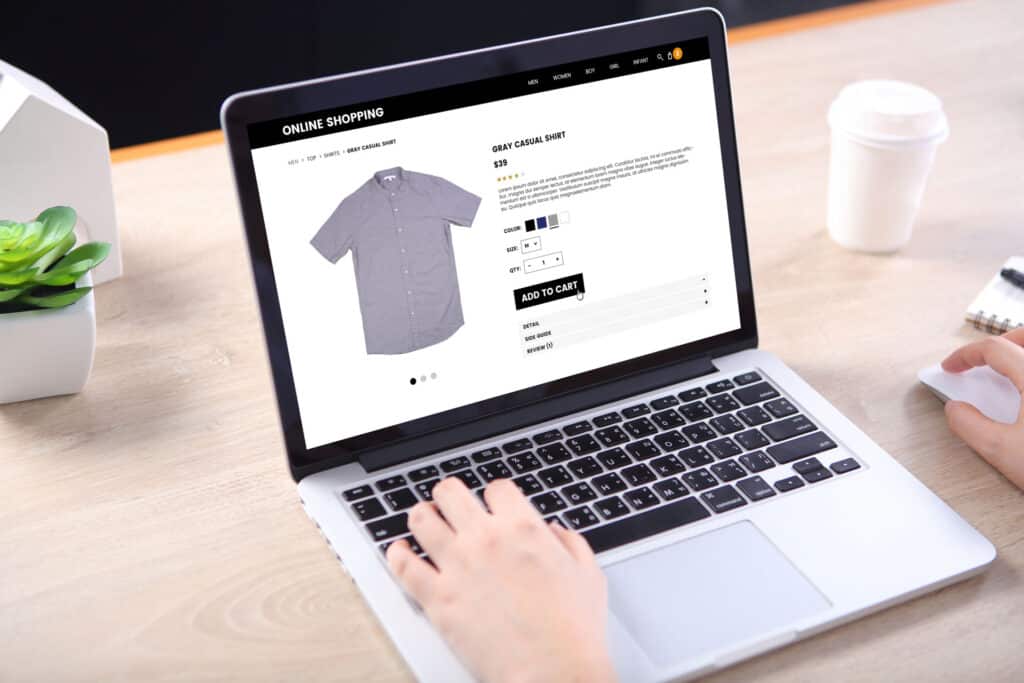Ecommerce is the buying and selling of goods and services over the internet. Using social media for ecommerce marketing allows businesses to sell their products and services in many ways.
Social media platforms have adapted to rise of ecommerce and made it easier for businesses to target potential customers, with features such as ‘swipe up’ links on Instagram Stories.
Social media can directly sell the product through on-platform shops on Instagram and Facebook, without users having to leave the app to visit a website. It can also be used to drive traffic to the business’ website, build brand awareness, conduct social listening, and engage in customer service.
Here are a few of the why’s and how’s when it comes to using social media for your ecommerce business:
WHY YOUR BUSINESS SHOULD USE SOCIAL MEDIA FOR ECOMMERCE
With social media being a free and easily accessible tool for businesses to engage with potential customers, using social media for ecommerce should be a no-brainer for your business. According to research conducted by The Harris Poll for Sprout Social, 73% of businesses are engaging in social commerce and 79% expected to be in the next 3 years.
A huge benefit for businesses using social media marketing for ecommerce is that these platforms allow you to specifically target your audience based on demographics, interests, and location. These advances in technology have made marketing efforts more effective. They enable you to create specific messages tailored to your audience’s wants, rather than general advertising appearing in print media, tv and radio.
A huge benefit for businesses using social media marketing for ecommerce is that these platforms allow you to specifically target your audience based on demographics, interests, and location. These advances in technology have made marketing efforts more effective. They enable you to create specific messages tailored to your audience’s wants, rather than general advertising appearing in print media, tv and radio.
GROW YOUR AUDIENCE
Social media campaigns can grow rapidly and reach a wider audience, far beyond the original reach of your paid campaign. Promoting your services or products on social media allows for the audience your message is reaching to multiply through viewers leaving reviews, likes, comments and shares.
CUSTOMER ENGAGEMENT
Using social media for ecommerce makes it easier to communicate with your target audience. It enables a business to engage in instant two-way communication with customers.
This can enhance the customer service experience by letting you answer questions or resolve queries swiftly. The Harris Poll conducted research on behalf of Sprout Social and found that “78% of consumers are more willing to buy from a brand and 77% will choose a brand over a competitor after a positive experience with a brand on social media.”
SOCIAL LISTENING
Your business can engage in social listening with social media. Social listening is simply knowing what people are saying about your product, or your competitors’ products, on social media. This allows you to see the conversation surrounding your offering and what others are offering. You can see what is working well and what needs to be improved in the eyes of your target audience.
INSIGHTS INTO YOUR TARGET AUDIENCE
Using social media for ecommerce gives you more insight into your target audience. It lets you see what kind of posts or ads draw them in using A/B testing. A/B testing is the method of running two ads promoting the same thing but using different images, call to action buttons or ad text. This will tell you what images, language and offerings are more attractive to your audience.
According to the Influencer Marketing Hub, “A global October 2020 survey of eCommerce decision-makers revealed that 12% of eCommerce companies planned on selling directly through social media platforms in 2021. Additionally, 30% of eCommerce companies reported that they were already selling on social media.”
WHAT TO CONSIDER WHEN DEVELOPING YOUR STRATEGY
First, you must decide on your social media ecommerce strategy by recognizing what your goals are, whether it’s driving traffic to your website, selling directly on social media, using social media to engage with potential and current customers, or conducting social listening.
When deciding on what social media channels your business should use for ecommerce, you must first consider which channels can help you meet your goals.
Then, decide which channels are most popular among your target demographic. If you’ve decided to use your social media channels to drive traffic to your website, you need to have clear calls to action to catch the eyes of your target audience, making it easy and clear for them to know how to purchase your product or service. Ensure your social media ads and posts are relevant to your audience so that you can get the most out of your paid advertising.
CONCLUSION
In conclusion, social media ecommerce is on the rise and is a great opportunity for businesses to grow their audience and target customers they otherwise would not have had access to. In 2021, 75% of the population in Ireland were using social media. This figure will only continue to grow. Therefore, all businesses should be utilising social media in their marketing strategy wherever possible.






